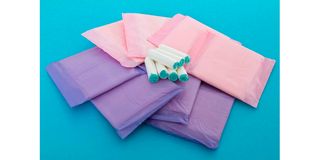Sakaja: City Hall to buy sanitary pads for needy schoolgirls

Poverty and lack of infrastructure in most schools in terror-prone Boni forest lock most girls on their menses out of class.
What you need to know:
- Governor Johnson Sakaja spoke during the launch of nominated Senator Gloria Orwoba’s Free Pad Bank Drive in celebration of World Menstrual Hygiene Day.
- The Pad Bank is a 20-foot container put up for collection of sanitary pad donations for distribution countrywide.
Girls in Nairobi’s informal settlements could soon have access to free sanitary pads if a proposed plan by the county government takes effect.
Governor Johnson Sakaja at the weekend announced that his administration would allocate funds to ensure needy schoolgirls get the pads every month. He promised to mobilise members of the county assembly (MCAs) to provide a budget.
“This will ensure schoolgirls and those from informal settlements get sanitary towels every month.”
Mr Sakaja spoke during the launch of nominated Senator Gloria Orwoba’s Free Pad Bank Drive in celebration of World Menstrual Hygiene Day. The Pad Bank is a 20-foot container put up for collection of sanitary pad donations for distribution countrywide.
The governor called for the end to period stigma, saying the pads drive will run concurrently with the county’s Food for Education initiative.
Ms Orwoba recalled how she was attacked by a section of Kenyans in social media and how she was asked to leave the Senate chambers after showing up in stained pants. In February, she attracted international attention after she was ejected from the Senate over an apparent blood stain on her trousers in what turned out to be an act of activism to advance her Bill that sought legislative intervention on menstruation.
The senator noted that establishing a pad bank in the 47 counties will ensure girls do not miss lessons for lack of sanitary towels. “I am always advocating against period shame, and so I thought I should go ahead and walk the talk,” she said.
Ms Orwoba further used the occasion to sensitise participants to a legislative proposal in which she wants to compel the state to increase allocations to the hygiene products for schools.
Lost learning time
According to Unicef, 65 per cent of women in Kenya cannot afford sanitary pads, and one million girls miss school each month because they cannot afford menstrual hygiene products.
A 2016 Unesco report estimates that one in 10 schoolgirls in sub-Saharan Africa skip lessons during their menstruation, while Education ministry data show that a girl absent from school for four days in 28 days loses 13 learning days, equivalent to two weeks of learning every term.
In an academic year (nine months), a girl loses 39 learning days, equivalent to six weeks of learning time. To address school absenteeism among schoolgirls on menses, the government launched the Sanitary Towels Programme in public schools.
The programme was first launched in 2011 under the Ministry of Education, which has been procuring and distributing sanitary towels to pupils from disadvantaged backgrounds. It is estimated that the Treasury has pumped Sh1.9 billion into the initiative, and 11.2 million girls have benefitted.
The programme previously targeted girls in schools in marginalised and slum areas. It was transferred from the Ministry of Education to the Ministry of Public Service, Youth and Gender Affairs during the 2017/18 financial year.
There has been an uproar over delay by the government to supply sanitary towels to schools. In February, Education Cabinet Secretary Ezekiel Machogu defended the government and announced that schoolgirls would start receiving sanitary towels to minimise absenteeism. Speaking in Mombasa on the sidelines of the biennial Kenya Universities Funding Conference, the CS said his ministry had purchased sanitary towels for public schools.
Women lawmakers
Women legislators have petitioned the government to accord them the distribution function. At a meeting with Mr Machogu last month, the MPs raised concerns that the current distribution mode, in which the ministry has the sole mandate, is not effective, as it does not reach all girls.
MPs Ann Muratha (Kiambu), Rebecca Tonkei (Narok), Jerusha Momanyi (Nyamira) and Kabondo Kasipul’s Eve Obara said that since Covid-19 hit the country in 2020, distribution had gone down. They claimed most girls do not benefit, hence end up missing classes.
In 2017, then President Uhuru Kenyatta signed the Basic Education Amendment Act, which places the responsibility of providing free, sufficient and quality sanitary towels on the government to reduce the number of girls missing school during the menstrual cycle.





